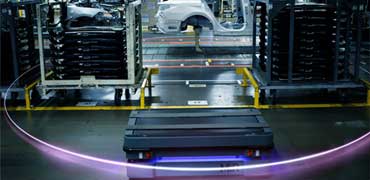Like every sector of global industry, manufacturing has faced significant challenges in the struggle to keep operating through the pandemic.
But unlike many other industries, manufacturing hasn’t been able to shift large parts of the workforce to homeworking. Efficient production lines are dependent on workers being on the floor — from the regular supervision that picks up and acts on a slight change in output quality, to the expert who comes in to tackle major issues.
Manufacturing has had to think fast and has responded with imagination, finding innovative ways to keep employees safe and supply chains secure. Solutions that pre-pandemic had only reached a pilot stage have found essential use cases overnight. Augmented reality has stepped up, with cameras on the ground helping remote experts to support workers in the factory to carry out essential maintenance. And a rapid take-up of location software is making sure workers can socially distance while getting the job done.
Building networks that can adapt to change
Manufacturers are using this spirit of imagination to reassess their business models, ready to respond to coronavirus, so digital transformation roadmaps are up for review. Some projects have been put on hold and others have been expedited to keep the supply chain going. Overall, the sector is looking for flexible options for transformation that are opex based to keep capital investment as low as possible and to make sure low usage is reflected in low costs. It’s all about anticipating a lot of change in the future, as manufacturers need to close some sites or embark on an intense phase of acquisitions, disposals and integrations to survive.
Picking up the cloud adoption pace
One trend that’s been accelerated is the move to open up the factory environment to cloud-based big data analytics, to improve manufacturing excellence — but this comes with significant security concerns. Anything that’s open, whether that’s in the physical or the virtual environment, has traditionally been seen as a threat, but the need to operate remotely in the pandemic has tipped the balance towards the cloud.
As they look for ways to move data outside the factory with the right levels of privacy and security, manufacturers are finding legacy systems a stumbling block. Many businesses are struggling to establish interfaces that will connect securely to the cloud and expect service providers to come up with models, tools and systems that can adapt to their legacy set ups.
This rapid expansion in the use of clouds is accelerating network transformation. Manufacturing businesses are rethinking their infrastructure to optimise it for new digital ways of working that use cloud-based applications to maximise the value they get from their data.
The search for adaptable and secure solutions
Adaptability is the watch word, as manufacturers move towards efficient and cost-effective networks that can flex and grow to support new business models. Whether it’s shifting to SAP systems in the cloud, or getting everybody collaborating on Teams, the focus is on providing an excellent user experience that’s also secure. New software-defined services are coming into play to manage complex business critical applications effectively and productively, and carrier-neutral facilities are optimising the way businesses access their clouds.
The manufacturing sector is constantly searching for excellence, and their infrastructure is no exception. Such high expectations mean that businesses will only undertake a digital transformation that brings industrial quality standards to their IT.
It takes more than tech to shape a global network
Technology alone is not the answer. For digital transformation to be truly successful, global manufacturing organisations also need an infrastructure with the right security, service and management.
We have a wealth of experience in network transformations and in developing software-defined solutions. During the pandemic, we helped customers across every sector extend bandwidth to support the move to homeworking securely – often in a matter of hours.
Our approach means that multiple technologies and legacy systems can be easily managed to create a single, secure global network infrastructure for your business.
The shape of things to come
Digital transformation has been accelerated by the pandemic – but, in doing so, it will transform the future of business. Through our expertise and choice of SD-WAN technology, network, cloud, security and management services, we can help you shape the future of your business too.
Get in touch or read ‘Shape your future infrastructure: A proposal’ for more detailed information on how we can guide your transformation


